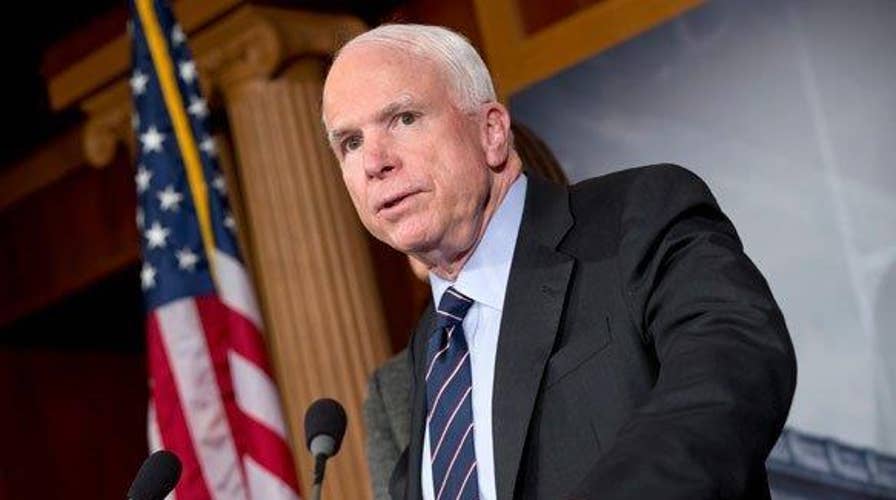McCain faces strong Democratic challenger in November
Jonathan Hunt reports from Temple, Arizona
2016 is a good year to be a member of the political establishment.
“What are you smoking?” you ask incredulously. Isn’t this the year of Donald Trump? Isn’t this the year everything got flipped on its ear?
Facts speak for themselves. And if there was any question that the “establishment” was still in good standing when it comes to GOP Senate races, look no further than the primary wins of Sens. John McCain, R-Ariz., and Marco Rubio, R-Fla., Tuesday night.
The victories of McCain and Rubio mean that 21 GOP senators have survived internal party challenges this cycle. Some big. Some small. And to be fair, McCain and Rubio face competitive general election races in swing states come November.
But this is not 2010. Or even 2012 for GOP Senate candidates. There’s no Tea Party darling like Sharron Angle in Nevada who proved incapable of toppling a very vulnerable then-Senate Majority Leader Harry Reid, D-Nev. No Richard Mourdock discussing rape and abortion after unseating then-Sen. Richard Lugar, R-Ind., in the primary. Mourdock’s loss helped propel then-Rep. Joe Donnelly, D-Ind., to the Senate in a red state. There’s no former Rep. Todd Akin, R-Mo., discussing “legitimate rape” and then losing to Sen. Claire McCaskill, D-Mo.
No one had to prove they weren’t in residence in Salem, Mass., in the late 17th Century and run TV ads declaring they weren’t “a witch,” as GOP Delaware Senate nominee Christine O’Donnell resorted to, before losing the general election race.
No, the Republican “establishment” didn’t do very well with those Senate nominees. And as a result, Republicans didn’t seize control of the Senate until 2014.
The GOP may well lose the Senate this November. But they have much stronger nominees on the field now, because the party’s “preferred” candidates or incumbents didn’t go down in flames to those who won the primary but were unelectable in the general.
McCain vanquished insurgent Kelli Ward on Tuesday.
Rubio didn’t even plan to run for re-election after he failed to secure the GOP presidential bid. But the senator later reversed course. That’s thanks in part to pressure from fellow Senate Republicans who implored Rubio to jump in. They believed Rubio was the best chance the party had to hold the seat in a swing state.
Reps. Ron DeSantis, R-Fla., David Jolly, R-Fla., and Florida Lt. Gov. Carlos Lopez-Cantera were going to seek the GOP nomination before Rubio jumped into this year’s Senate race. We can debate whether any of those candidates qualify as “establishment” had they won the nomination. But as a sitting senator, Rubio is more “establishment” than they are – despite Rubio’s Tea Party status six years ago.
Donald Trump is a factor in all of this, too.
Trump dwarfs both McCain and Rubio despite their wins – and despite the fact that Trump wasn’t on the ballot in either Arizona or Florida Tuesday. Few figures in public life drew as much of Trump’s ire as this duo. Trump derided McCain’s capture in the Vietnam War, questioning the senator’s status as a military hero. In primary debates, Trump taunted Rubio. Trump called the Florida Republican “little Marco.” Rubio returned fire, asking about the size of the GOP nominee’s hands.
But despite the criticism, McCain and Rubio gingerly supported Trump. That’s tough for them because they need Republican voters – some of whom are foursquare with Trump – to win. Of course, the challenge is courting Democrats and other Republicans who abhor Trump -- especially in swing key swing states. McCain and Rubio feared antagonizing both sides.
Now, the trick is winning re-election in these battleground states.
Republicans currently hold a 54-46 advantage over Democrats in the Senate. Two independent senators, Sens. Bernie Sanders, of Vermont, and Angus King, of Maine, caucus with the Democrats. Democrats would love to knock off either McCain or Rubio or both in their quest to wrest the majority from Republicans.
In just the past few days, pro-Democratic forces have started to delay and yank ad time for former Ohio Democratic Gov. Ted Strickland in his bid to unseat Sen. Rob Portman, R-Ohio. Such a maneuver somewhere was inevitable. Democrats were always going to whack an underperforming candidate in favor of someone with a better shot of defeating a Republican. Democrats are also trying to expand the field against Sens. Roy Blunt, R-Mo., and Richard Burr, R-N.C. It was a coup for Democrats to persuade former Sen. Evan Bayh, D-Ind., to run against Rep. Todd Young, R-Ind., for the seat of retiring Sen. Dan Coats, R-Ind. Otherwise, Coats’ seat was probably going Republican so long as Richard Mourdock didn’t show up.
Some analysts believe Strickland’s issues could ultimately cost Democrats a chance at controlling the Senate. It’s too early to tell. But one thing’s for sure. Rubio and McCain might not be popular in some sectors of the Republican Party. Some may even deride them as “the establishment.” But establishment or not, victories by Rubio and McCain make it easier for Republicans to hold the Senate. That’s a stark contrast to what happened in 2010 and 2012 when insurgents cleaned the clock of the Republican “establishment.”
Capitol Attitude is a weekly column written by members of the Fox News Capitol Hill team. Their articles take you inside the halls of Congress, and cover the spectrum of policy issues being introduced, debated and voted on there.





